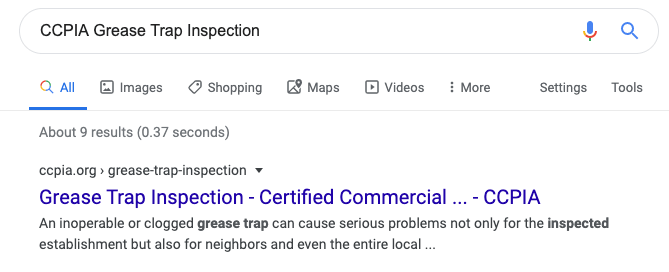As a professional commercial property inspector, you know how important it is to have a website that not only represents your business accurately but also attracts relevant visitors. That’s where blogging and SEO (search engine optimization) come in.
Why Optimize?
It’s important to keep SEO in mind when writing any sort of web content. CCPIA recommends using the six SEO techniques listed below. When these SEO techniques are implemented properly, your page will display higher in search engines like Google and Bing, and in relevant search results for when people search for commercial property inspectors.
NOTE: A good precursor to this article is What Is SEO for Commercial Property Inspectors?
1. Keywords are essential.
Keywords are the words and phrases in your website content that people will likely use to find your site. As a commercial property inspector, you’ll want to make sure that your content uses the words “commercial property inspection.” Other keywords may be words that are directly related to your ancillary services and your service area or location.
Think about when you enter a question or topic into the Google search navigation bar; the words you enter display in bold in the search results. Google recognizes these words as the keywords for that particular search. So, make sure your keywords are directly related to what you think your potential clientele would enter as their search text.

Search results for “CCPIA Grease Trap Inspection” (ranks as high as #1 for this specific search)
Also, as you scroll through search results, the results that match the text you entered appear first. Then, there are results that are missing words from the text you entered, and these rank lower in the search results.

Search results for “Denver Grease Trap Inspection” (ranks on page 2 for this specific search)
TIP: Make a list of keywords by considering your services and what your prospective clients would enter into the search navigation bar. What would they search for when they need to order the services you offer?
2. Avoid using SEO “stop words.”
SEO “stop words” are extremely common words that search engines skip over. These are words like “and” and “the,” and they’ll hinder your SEO efforts because search engines filter them out. That’s why you shouldn’t combine your favored keyword with another term.
If you offer both home inspections and commercial inspections, make sure you keep the two terms separate on your website(s), or you’ll risk losing valuable web traffic. Keep information about your home inspection services in one location and your commercial property inspection services in another.
Note that it is unlikely that prospective clientele will search for “home and commercial property inspector.” Instead, depending on their needs, they’ll search for either “home inspector” or “commercial property inspector” (or “home inspection” or “commercial inspection,” etc.).
3. Pay attention to keyword density.
While you’ll want to use your keyword(s) several times in your content, don’t overuse it. That’s where awareness of “keyword density” comes in.
It’s important to remember that the algorithms that Google and other search engines use are very efficient, and they’ve seen all the tricks and attempts at workarounds. The goal of search engine companies is to stay relevant, and that means delivering search results that are actually helpful to users. That’s why simply repeating your keyword dozens of times in your content is not a good idea; in fact, it will actually hurt you. Search engines grade and, therefore, rank naturally written language and how useful the material is.
Overusing a keyword is called “keyword stuffing” or “keyword spamming,” and it will harm your site’s ranking. A good rule of thumb is that your keyword density should be around 1.5 – 2%. In other words, for every 100 words of content, your keywords should account for about two of them.
4. Location, location, location.
Remember that your goal is for your website to be found by people who may hire you, and, generally speaking, those people are local to you, so use local SEO tactics by adding geographically-specific phrases about your market area within your entire website’s text.
If you’re located in Denver, Colorado, make sure your content mentions that. Also, consider sub-regions, satellite cities, and metro areas. If you’re in a rural area, it may be best to include the nearest city where business parks and retail districts are located. It probably won’t help you if you’re found by someone searching for a commercial property inspector in Connecticut.
Also, visitors typically like to contact local inspectors, so you may consider adding a picture to your website that shows you are local, such as a familiar town monument or another recognizable local geographic feature. Then, have your webmaster incorporate local SEO tactics for images (file name, alt text, and title text).
5. The length of your content is important.
You’ll want your general service content to be substantial enough for readers – and search engines – to sink their teeth into, but not so long that it feels like a chore to get through. In fact, it is unlikely that visitors will read all of your website content. Only competitors will read all of your webpage’s content; potential clients just scan it and make the decision whether to hire you or to exit and head for a competitor’s website. You should shoot for 500 to 750 words of content. Omit needless words. This will make the pertinent information stand out.
On the other hand, if you choose to use a blog and informational articles as part of your SEO strategy, their length should be longer. Shoot for 1,000 to 1,500 words. Ideally, blog posts and articles should lead to increased traffic generation because visitors staying longer on your website can positively influence the SEO of your website.
6. Utilize headings.
Headings make your content more reader-friendly, both for users and for search engines. They help to organize your content to be easily digestible, and they keep readers focused on the information you’re trying to impart. Headings also provide you with an opportunity to incorporate your keywords prominently. So, for instance, use headings when your separating home inspection services and your commercial inspection services on one page, or use two separate pages.
Now What?
Utilizing a good SEO strategy is crucial in making sure that your commercial property inspection business is found by potential customers. The six techniques listed here will give you an advantage over your competitors who aren’t considering this valuable marketing tactic.
You likely have hired a company to design, build, and manage your webpage, so you may not be able to directly incorporate these techniques. However, you can use this article as a checklist for your existing inspection business website and plan to add commercial inspections to your current services, or if you’re in the process of creating a new website.
Although your webmaster should be well-versed in optimizing websites, you should also have a general understanding of how to improve any weaknesses you may discover in your online presence.
Additional Commercial Inspection Resources:
Commercial Inspectors: Claim and Clean up Your Online Directory Listings
Do Online Business Reviews Matter?


